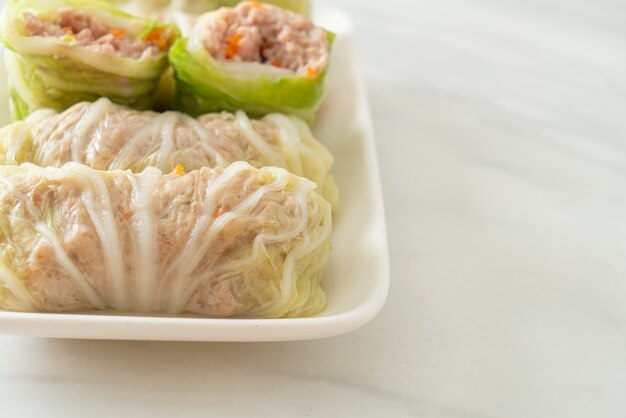How Long Does Cooked Cabbage Last in the Refrigerator? Your Complete Guide
Cabbage is a versatile and nutritious vegetable, beloved in many culinary traditions for its adaptability and rich flavor. Whether you're a fan of stir-frying it with spices or using it to add a crisp touch to your salads, it’s likely that at some point, you’ll encounter the question: How long can cooked cabbage safely stay in the refrigerator? This question sits at the intersection of food safety and waste prevention, making it crucial for efficient kitchen management. 🥬
In this guide, we’ll explore the lifespan of cooked cabbage in the refrigerator, backed by food storage tips, preservation techniques, and practical advice to ensure your cabbage remains fresh and safe to eat. Let’s dig in!
Understanding the Shelf Life of Cooked Cabbage
Optimal Storage Time
Once cabbage is cooked, its shelf life is limited compared to its raw counterpart. When stored properly in the refrigerator, cooked cabbage can typically last 3 to 5 days.
Key Tips for Optimal Shelf Life:
- Cool Rapidly: After cooking, allow the cabbage to cool rapidly within two hours. This prevents bacteria growth.
- Air Control: Store in airtight containers to maintain moisture and keep unwanted air away that can speed up spoilage.
Recognizing Spoilage Signs
Understanding when cooked cabbage has spoiled is essential. Common signs the cabbage has gone bad include:
- Unpleasant Odor: A sour or off smell indicates spoilage.
- Texture Changes: Sliminess or excessive moisture accumulation.
- Color Changes: Darkening or the appearance of spots can signal deterioration.
Being vigilant about these signs keeps meals safe and enjoyable.
Proper Storage Techniques
Refrigeration Protocols
To maximize freshness, take these steps:
- Use of Containers: Opt for glass or high-grade plastic containers that seal tightly to reduce oxygen exposure.
- Temperature Zones: Place in the main compartment (not the door) of the refrigerator where the temperature is more stable.
Prepping for Refrigeration
After cooking, ensure the cabbage is appropriately prepared:
- Cool quickly before transferring to the refrigerator to avoid temperature disruption.
- If possible, store in smaller, divided portions to speed up cooling and ease portion control.
Benefits of Proper Storage
Minimize Waste
Adhering to these principles helps in reducing food waste, a significant concern globally. By extending the life of cooked cabbage, you ensure meal planning is more efficient and environmentally conscious.
Health Considerations
Proper storage is pivotal for food safety and preventing illnesses that can result from bacterial contamination.
Financial Savings
Reducing spoilage saves you money by maximizing your grocery investments, allowing for strategic procurement and usage.
Cabbage Cooking and Storage Tips
To increase the longevity of cabbage, preparation in the kitchen also plays a role:
Cooking Before Storing: Look to slightly undercook cabbage if preparing for storage and potential reheating. This helps maintain texture and flavor.
Don't Overstock: Purchase amounts in line with your typical meal prep to minimize the risk of spoilage.
Exploring Preservation Alternatives
Freezing Cooked Cabbage
While refrigeration is often the first line of defense against spoilage, freezing offers an alternative method for prolonging cooked cabbage shelf life:
Steps for Freezing:
- Pre-Freezing Preparation: Allow the cabbage to cool thoroughly.
- Portion Control: Divide into smaller quantities for easy thawing and use.
- Freezer-Safe Storage: Use freezer bags or airtight containers. If opting for bags, remove as much air as possible before sealing.
Benefits of Freezing:
- Cabbage can last for up to a year when frozen, effectively safeguarding against waste.
- Freezing doesn’t drastically compromise its nutritional value, retaining a significant portion of its vitamins and minerals.
Pickling as a Long-Term Solution
For adventurous culinary aficionados, pickling presents a flavorful preservation approach, marrying longevity with a tangy twist.
Pickling Process:
- Submerge cabbage in a vinegar-rich brine combined with spices to create flavorsome pickles.
- Once pickled, store in a cool, dark place initially, then refrigerate after opening for extended use.
Pros of Pickling:
- This method transforms cabbage into a versatile ingredient, excellent in salads or as a side.
- Pickling enhances the probiotic content, abetting gut health.
Visual Storage Guide: Quick Tips
Here's a concise breakdown of optimal cabbage storage techniques:
🗂️ Refrigeration Quick Tips
- 📅 Timeframe: 3-5 days in the refrigerator
- 🥶 Rapid cooling post-cooking
- 💧 Airtight container use
🗂️ Freezing Quick Steps
- Cool, portion, and store in freezer-safe bags
- 🗓️ Lasts up to 12 months
🗂️ Pickling Highlights
- Longevity and flavor boost
- Gut-friendly option
Conclusion: Smart Practices for a Fresh Kitchen
Understanding how long cooked cabbage can last in the refrigerator empowers you to make informed decisions in the kitchen. Adopting these safe storage and preservation methods not only maximizes shelf life but also enhances your cooking repertoire with new flavors and techniques. As you navigate food storage, remember that the proactive management of perishable goods contributes to a sustainable lifestyle—ensuring fewer trips to the store, less waste at home, and tastier, nutritious meals. 📦
Balancing the art of cooking with the science of storage will turn your kitchen into a well-organized space that optimizes every ounce of your culinary endeavors. Bon appétit!

